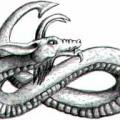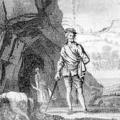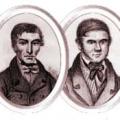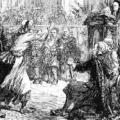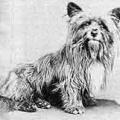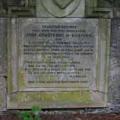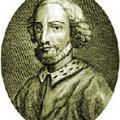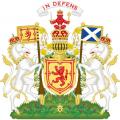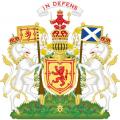Categories
Most Liked
Posted on July 17, 2013
by Amanda Moffet
by Amanda Moffet
Posted on May 12, 2013
by Chas Mac Donald
by Chas Mac Donald
Posted on August 29, 2013
by Amanda Moffet
by Amanda Moffet
Posted on February 7, 2013 by Donald | 5 views | comments
Never mind Nessie, the scariest creature ever to roam Scotland was the infamous Linton Worm.
A 'Worm' was another term used for a dragon (orme or worme is the ancient Norse for serpent), and the Linton worm lived in a hollow on the Northeast side of Linton Hill. This area is still known as 'Worm'...
Posted on February 7, 2013 by Donald | 5 views | comments
In recent times the stories of Hannibal Lecter and the real life horrors of Jeffrey Dahmer have provided chilling accounts of cannibalism. However, Scotland can lay claim to one of the most gruesome horror tales ever recounted - the legend of Sawney Bean.
Sawney Bean was born in East Lothian appro...
Posted on February 7, 2013 by Donald | 14 views | comments
The year is 1836 and five young boys are roaming Arthurs Seat in Holyrood park, Edinburgh - hunting for rabbits, what they find defies belief and brings back to the public's attention one of the most gruesome periods of our capital's history.
Buried in a small cave they find 17 miniature coffins ...
Posted on February 7, 2013 by Donald | 4 views | comments
Throughout history there are incidents that at the time may seem small or even insignificant, the action of a few individuals who would normally be considered mere spectators in the pageant of history. Some obvious incidents come to mind; The Boston Tea Party or the assassination of Archduke Ferdina...
Posted on February 7, 2013 by Donald | 4 views | comments
Even since the first wild dog came sniffing around a stone age camp fire looking for scraps our relationship with these animals has been a close one. Many stories exist of this bond between man and dog and Scotland has its fair share. However the most famous by far was Bobby - the Skye Terrier.
...
Posted on February 7, 2013 by Donald | 3 views | comments
The Armstrong Clan has been without a chief for over 450 years, the story behind this is one laced with intrigue, murder, piracy and even hidden treasure. The stuff movies are made from.
The story is set around Johnnie Armstrong of Gilnockie and the Border Reivers in the 16th Century. Johnnie Arm...
Posted on February 7, 2013 by Donald | 1 views | comments
Máel Coluim mac Cináeda (Malcolm II) was King of Scots from 1005 until his death. He was a son of Cináed mac Maíl Coluim; the Prophecy of Berchán says that his mother was a woman of Leinster and refers to him as forranach (the Destroyer or Avenger).
To the Irish annals which recorded his death, Má...
Posted on February 7, 2013 by Donald | 0 views | comments
Cináed mac Duib (Kenneth III) was King of Scots from 997 to 1005. He was the son of Dub mac Maíl Coluim.
The only event reported in Cináed's reign is the killing of Dúngal mac Cináeda by Gille Coemgáin mac Cináeda, by the Annals of the Four Masters s.a. 999. It is not certain that this refers to ...
Posted on February 7, 2013 by Donald | 0 views | comments
Causantín mac Cuilén was king of Scots from 995 to 997. He was the son of Cuilén mac Iduilb.
Causantín became king upon the death of Cináed mac Maíl Coluim, supposedly killed by Finnguala, daughter of Cuncar, Mormaer of Angus, a killing with which Causantín is associated in several accounts. John...
Posted on February 7, 2013 by Donald | 1 views | comments
Cináed mac Maíl Coluim was King of Alba. The son of Máel Coluim mac Domnaill, he succeeded Cuilén mac Iduilb on the latter's death at the hands of Amdarch of Strathclyde in 971.
In 973, the Chronicle of Melrose reports that Cináed, with Máel Coluim mac Domnaill, the King of Strathclyde, "Maccus, ...
Posted on February 7, 2013 by Donald | 1 views | comments
Cuilén mac Iduilb was king of Alba from 967 to 971. He was one of three known sons of Idulb mac Causantín, the others being Amlaíb and Eochaid.
It is supposed that Cuilén was implicated in the death of his predecessor Dub mac Maíl Coluim, who had defeated Cuilén in battle in 965.
The Chronicle o...
Posted on February 7, 2013 by Donald | 0 views | comments
Dub mac Maíl Coluim was king of Alba. In older histories his name may be found anglicised as Duff; the modern Gaelic version is Dubh, which has the sense of dark or black. It may be that Dub was an epithet, as the Duan Albanach refers to him as Dubhoda dén, Dubod the vehement or impetuous. He was ...
Featured Articles
Most Discussed
Posted on July 16, 2013
by Amanda Moffet
by Amanda Moffet
Posted on February 6, 2013
by Donald
by Donald
Posted on July 17, 2013
by Amanda Moffet
by Amanda Moffet


 View More
View More View Less
View Less